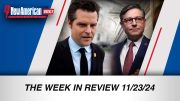
The Office of the Special Counsel (OSC) announced Wednesday that Secretary of Health and Human Services (HHS) Kathleen Sebelius violated the Hatch Act by delivering political remarks at an official administration event. She had delivered the comments during a keynote speech at the Human Rights Campaign Gala in February.
“Sebelius violated the Hatch Act when she made extemporaneous partisan remarks in a speech delivered in her official capacity on February 25, 2012,” the OSC’s official news release stated. Providing more specific details on the violation, the statement affirmed:
The Hatch Act prohibits federal employees from using their official authority or influence to affect the outcome of an election. A federal employee is permitted to make partisan remarks when speaking in their personal capacity, but not when using their official title or when speaking about agency business.
After the event, the Department of Health and Human Services (HHS) reclassified the trip from official to political and issued a statement to that effect. Secretary Sebelius and HHS reimbursed the U.S. Treasury for all costs and expenses associated with her travel to the event. OSC found no evidence that Secretary Sebelius made any other political statements in her official capacity.
Sebelius’ violation was far from subtle, as she explicitly called for the reelection of President Obama, among other Democrats. The counsel discovered that “the Secretary departed from her prepared outline” when she declared to the event gathering, “it’s hugely important to make sure that we reelect the President and elect a Democratic governor here in North Carolina.”
The HHS secretary acknowledged her misstep, but bemoaned the difficulties of blending trips that address both campaign and official political issues. “I regret making statements that converted my participation in the event from official to political,” she said in a seven-paragraph e-mail to the OSC. “As I have also explained, keeping the roles straight can be a difficult task, particularly on mixed trips that involve both campaign and official stops on the same day. Since this incident, I have met with the ethics attorneys at the Department to ensure that I have an accurate understanding of what types of statements are prohibited at an official event.”
Sebelius then protested the special counsel’s continued pursuance of this “minor” issue after she had already “rectified” the situation by reclassifying the trip and repaying the expenses. “I believe that you should have concluded that any violation was corrected when the event was reclassified as political,” she added in her e-mail. “I believe that you should have concluded that the consequence of my going ‘off script’ at an official event was to change the nature of my appearance for cost reimbursement purposes only.”
Of course, Sebelius’ wrongdoing is hardly an isolated incident, as the Obama administration’s decision to permit cabinet secretaries and White House officials to speak at events sponsored by prominent Democratic electioneering groups has spawned other concerns relating to the Hatch Act.
During a fundraiser event sponsored by pro-Obama Priorities USA Super PAC in March, senior White House advisor David Plouffe delivered a speech to more than 20 chief Democratic donors. However, just before the audience was asked to open up their wallets, Plouffe swiftly exited the room. As previously noted, FEC rules on Super PACs ban expenditures “made in cooperation, consultation or concert with, or at the request or suggestion” of candidates and their political campaigns. The Hatch Act bars administration officials from soliciting money for a partisan political group or use their political position to influence an election.
Many of the groups bolstering the president’s reelection effort work in concert with former administration staffers and friends who often visit the White House, and who also allow the Obama campaign to raise bundles of covert donations — an effort Obama once claimed to abhor.
The Daily Beast made news in June after obtaining recordings that reveal Obama pleading for campaign contributions. Illustrated as a “rambling conference call” from Air Force One, Obama allegedly spoke for nearly 20 minutes about how the Democratic Party was in danger of being outspent by Republicans, as well as in danger of losing Congress and even the White House.
“The majority [of people] on this call maxed out to my campaign last time. I really need you to do the same this time,” the president said, according to the Beast. Further, the publication reported:
“I’m asking you to meet or exceed what you did in 2008,” the presidential pitchman continued, speaking to donors who were invited to dial in based on their contributions during the last election. “Because we’re going to have to deal with these super PACs in a serious way. And if we don’t, frankly I think the political [scene] is going to be changed permanently. Because the special interests that are financing my opponent’s campaign are just going to consolidate themselves. They’re [going to] run Congress and the White House.”
These incidences are among a string of other questionable administration dealings that unveil questions over violations of the Hatch Act and other efforts of politicking on the taxpayers’ dime.
“That the secretary violated federal law in this manner is disturbing, but hardly a surprise,” a spokeswoman for Sen. Orrin Hatch (R-Utah) charged. “Since almost day one, this administration has had a singular focus on politicking — not governing — that’s borne out by the secretary ignoring a strict prohibition on electioneering while working for federal taxpayers.”


